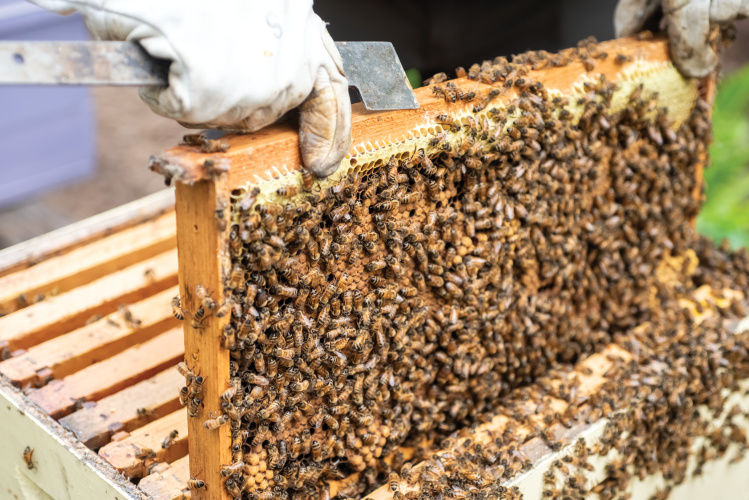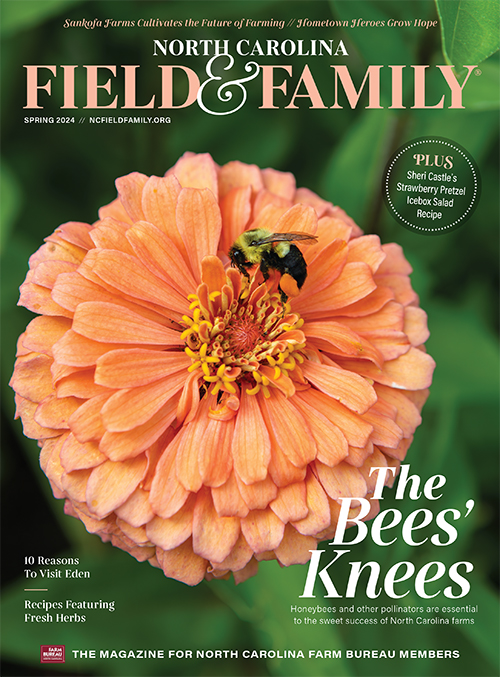Honeybees Are Essential to the Sweet Success of North Carolina Farms
Though some might see them as stinging pests, North Carolina honeybees are a valuable and vital asset to agriculture.
Danielle Rotella Adams |
Soft with fuzzy, yellow fur, two sets of wings and dark brown bands in their midsections, honeybees are only 12 to 15 millimeters long, but these tiny insects are hugely important. Though some might see them as stinging pests, North Carolina honeybees are a valuable and vital asset to agriculture.
North Carolina Honeybees Are the Bees’ Knees
North Carolina is home to more than 500 species of native honeybees, from carpenter bees to miner bees, making them the most prolific pollinators in the state. Their fur collects pollen, allowing the bees to remove large amounts as it sticks to the hair on their legs. In fact, honeybees alone pollinate $15 billion worth of crops annually in the United States – in addition to producing millions of dollars’ worth of honey.
“North Carolina honeybees are responsible for pollinating cucumbers, blueberries, watermelons, apples, squash, strawberries, melons and peaches,” says Jeff Crane of Cole’s Farm in Jacksonville.
One-third of the food Americans eat comes from crops pollinated by honeybees, including cucumbers, cherries, broccoli and almonds, to name a few.

Cole’s Farm
Crane and his wife, Jennifer, are active Onslow County Farm Bureau members, and in 2017, they started Cole’s Farm, where they keep 15 beehives and specialize in raw honey and swarm relocations.
As an active-duty U.S. Marine, Crane prefers to keep their operation small until he retires. They plan eventually to expand the business by creating a “host-a-hive” program so homeowners can have backyard hives without handling the upkeep.
In the meantime, they use Instagram and YouTube to highlight their beekeeping work and keep followers updated on their honey and hives.
Animals and Livestock
Plotting to Attract Pollinators

Crossroads Honey Farm
Wayne Rose, who grew up on a tobacco farm in Roper, has cared for North Carolina honeybees since he was 13 years old. He incorporated Crossroads Honey Farm in 1987.
“My Uncle Ken was a commercial beekeeper in Michigan, and he asked me to help with his bees one summer, and I’ve had bees ever since,” he says.
Now, with 1,000 beehives, Rose is active in the agriculture and beekeeping communities. He serves as president of Washington County Farm Bureau and as chairman of North Carolina Farm Bureau’s Beekeeper, Pollination and Honey Advisory Committee, where he works with area farmers on their crop pollination and other key initiatives.
Those other initiatives include helping create the North Carolina Zoo bee exhibit, assisting in hiring entomology professor David Tarpy at NC State and, most recently, working on DriftWatch, a software that allows crop producers, beekeepers and pesticide applicators to work together to protect specialty crops and apiaries using a software mapping program.
“Beekeepers can register their hives online to let farmers know where to find beehives in their area,” Rose explains.
DriftWatch also pinpoints beehive locations so pesticide applicators don’t do aerial spraying near the hives.

Secret Garden Bees
Retired Army veteran Jim Hartman started Secret Garden Bees in 2014 on his 22-acre farm in Linden, where he sells honey and jam.
A 2023 semifinalist in the American Farm Bureau Ag Innovation Challenge, Hartman didn’t plan to become a professional beekeeper but read that working with bees could help his anxiety and post-traumatic stress disorder.
“Working with honeybees, you have to be steady and calm, and after I got a few hives, I realized it was really good for me,” he says. His wife saw his anxiety go down right away and said he was a better person to be around when he was caring for bees.
Today, Secret Garden Bees honey can be found in stores throughout North Carolina and as far away as Tulsa and Chicago.

Protecting Pollinators
All three beekeepers agree that the biggest threat to bees are varroa mites (Varroa destructor.) According to the NC State Apiculture Program, in North Carolina alone, the number of managed beehives has dropped by an estimated 44% since the invasion of the mites in 1990. If a mite gets on a single bee, it will transfer to the entire colony.
“Once they’re in your hives, you can’t get rid of them,” Hartman says. “They carry viruses and diseases that weaken hives.”
Thankfully, there are remedies to help combat mites. Harman applies Apiguard, a natural, slow-release gel, on top of his hives. It doesn’t completely kill the mites but keeps them under control.
Crane uses another tactic. “Our go-to method is vaporizing with oxalic acid,” he says. The organic compound is entirely natural, and it only adversely affects the mites, not the bees, as long as it’s applied correctly.
So, the next time you see a honeybee, keep in mind how they give back. From pollinating crops to producing honey, they create valuable farming opportunities for North Carolina beekeepers – not to mention the food on your table.
“Without honeybees, Americans wouldn’t have much to eat,” Crane says.
– Danielle Rotella Adams






I enjoyed this edition of
Field & Family and wondered where I can purchase honey from Crossroads Honey Farm in Eastern N.C.
Where can I purchase honey from Crossroads Honey Farn in Eastern N.C.?
The opening statement “500 species of native honeybees” is questionable. The honeybee was brought to the usa with settlers. There are many Native Bees but not those that make and store honey.